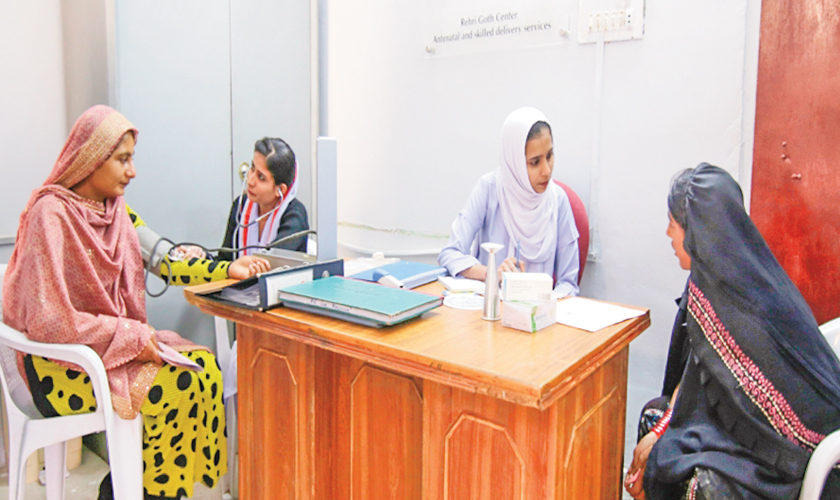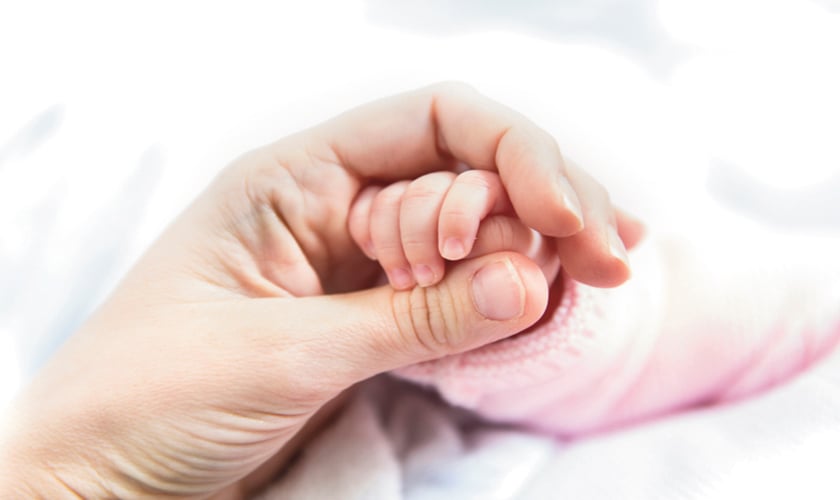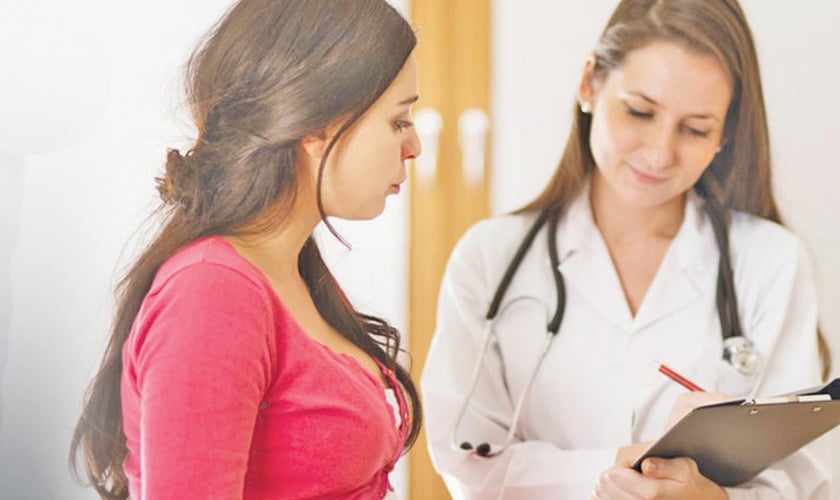International Day for Maternal Health and Rights is observed on April 11. In this regard You! talks to gynaecologist Dr Hurriyeh Moffedi who shares her expert views on maternal health care system in Pakistan...
 International Day for Maternal Health and Rights is observed on April 11. In this regard You! talks to gynaecologist Dr Hurriyeh Moffedi who shares her expert views on maternal health care system in Pakistan...
International Day for Maternal Health and Rights is observed on April 11. In this regard You! talks to gynaecologist Dr Hurriyeh Moffedi who shares her expert views on maternal health care system in Pakistan...
Motherhood is a positive and fulfilling experience but sadly the circumstances may not always be favourable for every woman who wishes to bring a life into this world. For many women, especially from the lower strata of the society, pregnancy often results in suffering, ill-health and even death due to lack of awareness and health care facilities. The fact is that every woman has the right to a dignified pregnancy, a safe delivery, and access to skilled care. And for that maternal health care plays an important part.
What is maternal health?
"Maternal health refers to the health of women during pregnancy, childbirth and the postpartum period. Maternal care starts from home. There are many factors that contribute to the overall health of an expectant woman including proper nutrition, antenatal care and optimum healthcare facilities. As soon as a woman conceives, the family especially the husband should take extra care that she doesn't go through any sort of abuse - be it physical or verbal. This directly affects the health of a mother as well as the foetus," says Dr Hurriyeh Muffedi, who has been dealing with female reproductive health related problems for more than 25 years now at Sobhraj Hospital, Karachi.
According to her, another major aspect attached to maternal health that needs to be considered involves the environment where the delivery of the child takes place. "It is important for both the mother and the child to be in safe hands and be provided with proper medical care," she adds.
Stats show:
If we take into account the stats, World Health Organisation (WHO) reports that each year, almost 289,000 women die during pregnancy and childbirth out of which 99 per cent of them are from the developing world. For instance, in 2015, 5.6 million women and babies died due to complications in pregnancy, childbirth and in the first month of life including 303, 000 maternal deaths, 2.7 million newborn deaths and 2.6 million stillbirths. Complications during pregnancy and childbirth are the world's second leading cause of death for girls aged 15 - 19. And for every maternal death, more than 40 women suffer severe complications that cause injury, infection, or disease. Many more suffer human rights abuses when seeking care before, during, and after pregnancy and childbirth. And this leads to maternal mortality (death).

The scenario in Pakistan:
While the world has achieved impressive reductions in maternal deaths, unfortunately, the situation in our part of the world is unsatisfactory. Healthcare system in Pakistan is the most neglected area, hence the situation isn't favourable for women especially expectant moms. Dr Moffedi stresses on the need to have more trained midwives, lady health workers (LHW) and nurses to tackle the situation efficiently. "If we just take into account the current situation in Karachi, concerning maternal health, it has been observed that there is a lack or professionals in the field which is why our doctors are overworked and have to attend various patients at a time. The need is to work on grass root level and by that I mean training our dais or midwives so that they are able to properly handle the complications if any," she explains.
She further emphasises that it is very essential to train these midwives operating in different areas of the city so that they can cater to women belonging to the area. "This will make it easier for the expectant mom to talk freely regarding her concerns about her pregnancy and health of the baby."
Antenatal care:
"When you first learn that you are pregnant, getting in touch with a midwife or general physician is termed as antenatal care. The care you receive from healthcare professionals during your pregnancy is the most important element that includes regular checkups, blood pressure control, ultrasounds that result in a safe delivery process," informs Dr Moffedi.
Antenatal care and skilled health attendance at delivery are essential for eliminating every preventable maternal death. The world, as a whole, has improved access to these services, with 71 per cent of women delivering with the support of a skilled birth attendant. What is more, very substantial disparities exist in levels of access to services, with poorer, less educated women receiving unacceptably low levels of access to services. Women in the richest quintile are almost three times as likely to deliver with a skilled health attendant as those in the poorest quintile.
Maternal issues:
Pregnancy can provide an opportunity to identify existing health risks in women and to prevent future health problems for women and their children. These health risks may include hypertension and heart disease; diabetes; depression; genetic conditions; sexually transmitted diseases (stds); inadequate nutrition and unhealthy weight.
"The risk of maternal and infant mortality and pregnancy-related complications can be reduced by increasing access to quality preconception (before pregnancy) and interconception (between pregnancies) care. Moreover, healthy birth outcomes and early identification and treatment of health conditions among infants can prevent death or disability and enable children to reach their full potential," states Dr. Moffedi.

Maternal mortality:
The major causes of maternal morbidity and mortality include haemorrhage, infection, high blood pressure, unsafe abortion, and obstructed labour. However, the most common cause of death for pregnant women is pre-eclampsia, despite the fact that a low-cost, easy to administer drug exists to treat it. The drug, magnesium sulfate, is available in most developing countries.
The perinatal period:
Perinatal and maternal health are closely linked. The perinatal period commences at 22 completed weeks (154 days) of gestation and ends seven completed days after birth. Sadly, the rate of perinatal mortality is quite high. Perinatel mortality refers to the number of stillbirths and deaths in the first week of life. In 2009 there were 2.6 million stillbirths globally with more than 8200 deaths a day. Among the 133 million babies born alive each year, 2.8 million die in the first week of life. The patterns of these deaths are similar to the patterns for maternal deaths; the majority occurring in developing countries. Quality skilled care during pregnancy and childbirth are key for the health of the baby and the mother.
What can be done?
Women and girls must have access to comprehensive maternal health care that includes: family planning; essential medicines; skilled, rights-based, and respectful maternity care; HIV prevention and treatment; and, safe voluntary abortion services.
Improving emergency obstetric care:
Almost half of births in developing countries take place without a skilled birth attendant. That ratio rises to 65 per cent in South Asia. Research shows the single most important intervention for safe motherhood is to make sure that a trained midwife is present at every birth; that transport is available to referral services; and that quality emergency obstetric care is available.
Spreading awareness:
Educating women especially young girls is the key. Educated mothers are more health conscious, and are aware of postnatal care. They are more likely to avoid HIV infection and can introduce good health and sanitation practices to their families and throughout their communities.

Preventing mother-to-child transmission of HIV:
From 1998, UNICEF on behalf of other United Nation partners has been providing country support for prevention of mother-to-child transmission (PMTCT) programmes within existing maternal and child services in resource-poor settings. This includes facilitating young women and parents with education of HIV/AIDS.
UNICEF along with World Health Organization aims to ensure that 3 million people have access to antiretroviral treatment in the near future. Services also include voluntary and confidential counselling and testing for HIV/AIDS. If an expectant mother has the virus or AIDS, she needs to be counselled on how to help prevent transmitting the disease to her child, including safer breastfeeding practices.
Counselling is the way to go:
The job of a counsellor is to provide a variety of counselling, rehabilitation, and support services. Unfortunately, in Pakistan, counsellors are very rare to find. “When it comes to counselling especially in the health sector, be it sex education, maternal health care, pre and post operative counselling, etc., we are lagging far behind. There are hardly any centres where proper counselling sessions are provided. Over here, almost every doctor is overburdened and doesn't have the time to counsel his/her patient. I believe 90 per cent of the problems can be solved through counselling. If an expectant woman along with her husband goes for counselling and is educated about the benefits of maternal health, there will be no complications and the mother and baby will be safe and healthy,” concludes Dr. Hurriyeh.
Key facts by World Health Organisation:
About the International Day for Maternal Health and Rights:
April 11 is recognized as the International Day for Maternal Health and Rights to demonstrate the urgency of increasing global action on this issue. Pregnancy, childbirth, and HIV are the leading causes of death for girls and women of reproductive age (15 to 49 years). While maternal mortality is declining globally, it remains persistently high in sub-Saharan Africa and South Asia. Maternal health advocates, researchers, and providers are committed to ending human rights abuses and promoting skilled and dignified care. Keeping this pressing issue in mind, various organisations collaborated together and introduced 'International Day for Maternal Health and Rights' two years ago. Sadly however, this Day has not been recognised universally as yet.